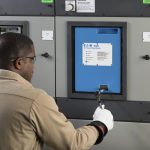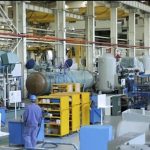Importance
of Sampling
Safely Monitoring Material Can Assure
High-Quality Output
It’s difficult to overstate the importance of sampling when it comes to meeting specifications and maintaining quality in a chemical plant, and that’s the specialty of Sentry Equipment. The strategic supplier bills itself as perhaps the only company that can handle just about any sampling application, anywhere, providing methods to monitor steam, water, gas, liquid, solids, powder, pellets and slurries, says Jeff McKinney, Sentry Equipment industry manager. “Whatever phase or form the sample takes, we have solutions for it,” he maintains.
But Sentry Equipment’s work doesn’t end there. The company can’t stop corrosion in a plant, but it helps monitor corrosion. That’s a vital activity for plant management and operators, according to more than 100 interviews eChem Expo conducted in the months leading up to the conference and exhibition. “Corrosion goodies” include Sentry Saf-T-Vise chemical injection sample quills and atomizers that disperse the chemicals that plants inject to prevent corrosion, along with probes and coupon holders, McKinney says.
While monitoring corrosion and helping with nearly any type of sampling, Sentry Equipment also aims to rectify a common problem in process-plant culture. “A company … will spend tens of millions of dollars to keep their products safely contained in tanks or pipes or what have you – except for two times,” he says. “One is when they sell it. They’ll take it out of their pipes and shoot it somewhere else. The other is when they sample it.”
Sentry Equipment can’t stop corrosion in a plant, but it helps monitor corrosion.
During sampling, many plants willingly expose an operator and the environment to hazardous chemicals and potentially dangerous situations. So improving sampling techniques to monitor materials safely and consistently becomes gravely important and Sentry Equipment strives to help plants accomplish that, McKinney emphasizes.
To that end, eChem Expo attendees who spend some time at the Sentry Equipment booth stand to learn about criteria for the selection of grab sampling over continuous process analysis, problems with manual samplers that can result in erroneous lab results and how to address those problems.
Sentry Equipment collaborated with John Twork, who retired from Eastman Chemical Co. after more than 30 years on the job, to prepare material for eChem Expo sessions. “The presentation brings together the perspective of a long-time chemical-industry insider and a long-time strategic partner to the chemical industry,” McKinney says.
The result of that collaboration shows where the Sentry offerings properly fit into the plant process – or even the thought process of a chemical, process, mechanical or maintenance engineer or operator involved with samplers, McKinney says. It includes exploring when to use samplers and how samplers may develop in the future, he notes. “Anybody who has a question or a sampling problem should visit our booth and/or attend the talk,” he suggests.
“Whatever phase or form the sample takes, we have solutions for it.”
Jeff McKinney
Sentry Equipment industry manager
Factory-authorized technicians help keep Sentry equipment operating optimally from installation to shutdown.
At the show,
Sentry representatives also plan to address design and maintenance considerations for differing types of sample media, such as solid, liquid and gas, as well as advances in “smart” sampling systems. The company plans to present visions of a future where micro-sensor technology will meld with sample system design. The company plans to discuss the role of process measurement using grab sample lab analysis to monitor process variables that are either too costly or too impractical outside the laboratory. It will also consider the critical balance between the safe operation of manual sampling systems and the need to respond quickly to changes in the process.
The eChem Expo focus area that aligns with Sentry solutions is safety and environment, McKinney notes, adding that capital effectiveness, rapid execution and enhanced capabilities also come into play with the company’s products.
The company incorporates all of those qualities into its offerings, and it often performs niche work for big process firms, including custom work when necessary, McKinney continues. Novel sampling system designs sometimes points to a path for future development work, he says.
The role of process measurement to monitor variables that are either too costly or too impractical outside the laboratory will be discussed at eChemExpo.
It’s all about increasing productivity, reducing energy use and operating plants in a safe and stable manner. That’s part of developing measurement technology coupled with process control capability to run processes closer to a target set point.
In fact, sampling can even become a matter of life or death. Sentry Equipment built the first post-accident sampling system after a series of incidents in 1979 at Three Mile Island Nuclear Generating Plant near Harrisburg, Pa., Americans of a certain age may remember what happened at the nuclear power plant there as one of the most harrowing events in the nation’s history.
At Three Mile Island, human error and mechanical failures combined to create a partial meltdown of the nuclear reactor core that released radioactive gasses and radioactive iodine. Working with the Nuclear Regulatory Commission and Metropolitan Edison, Sentry Equipment devised a way of safely capturing extremely radioactive materials there. “It’s an example of a high-profile challenge that we handled,” McKinney says.
It’s all about increasing productivity, reducing energy use and operating plants in a safe and stable manner.
More recently, the Sentry brand has grown through acquisition. In the two years since the most recent eChem Expo, the company has purchased Cobra Sampling Inc., a manual sampling company. As a result, Sentry Equipment expanded its knowledge base and product reach, especially in the chemical and refining markets, McKinney says. Through the acquisition, they established the Process Monitoring Tech Center, a center of excellence for hydrocarbon processing, and it has invested funds to enlarge its presence in those areas, he notes.
Oconomowoc, Wis.-based Sentry is employee-owned and employs about 180 workers and operates in more than 50 countries on all six continents. It got its start in 1924 as a maker of dairy boilers and evaporators, later evolving into a sampling provider. It took the name “Sentry Equipment” because it protected material quality and guarded against corrosion in boilers, according to the company website.


